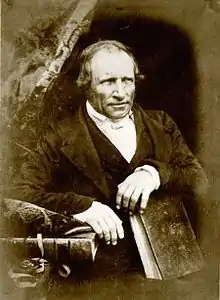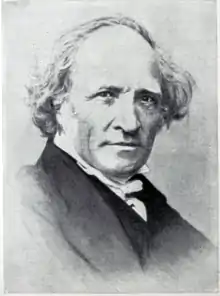Alexander Keith (minister)
Rev Dr Alexander Keith DD (1792–1880) was a Church of Scotland and Free Church minister, known for his writings on biblical prophecy.

Life
He was the son of George Skene Keith of Keith Hall and Kinkell, where he was born at the manse on 13 November 1792. He graduated M.A. at Marischal College, in 1809.[1][2] He was ordained by the Church of Scotland as minister of St. Cyrus in 1816, remaining there until 1839.[3]
At the Disruption of 1843, Keith left the established Church of Scotland and joined the Free Church of Scotland.
Keith is probably best remembered for his book, Evidence of the Truth of the Christian Religion Derived from the Literal Fulfillment of Prophecy, which has gone through numerous revisions and many editions. It is still in print in a 2005 edition from Kessinger Publishing.
He died in Buxton, Derbyshire, on the 8th of February 1880, and was buried, at his own request, in the graveyard at Chinley Chapel.[4]
The Holy Land

Keith is also remembered as one of four Church of Scotland ministers who in 1839 undertook a Mission of Inquiry to Palestine. The others were Andrew Bonar, Robert Murray M'Cheyne and Dr. Alexander Black.[6] The group travelled through France, Greece, and Egypt then overland to Gaza. The route home led through Syria, the Austrian Empire and some of the German States. The group sought Jewish communities along the route to inquire about the readiness of these communities to accept Christ and, separately, their preparedness to return to Israel as prophesied in the Bible. Keith recounts the journey in his 1844 book The Land of Israel According to the Covenant with Abraham, with Isaac, and with Jacob. It was also in that book that Keith used the slogan that became popular with other Christian Restorationists, A land without a people for a people without a land. In 1844 he revisited Palestine with his son, Dr George Skene Keith (1819–1910), who was the first person to photograph the land.[7]
Keith is one of a large number of Christians who campaigned for a restoration of the Jews to their ancient homeland. In 1844 he wrote: "Greece was given to the Greeks, and in seeking any government for Syria, may not a confederacy of kings - give Judea to the Jews?" [8]
Books
- Sketch of the Evidence from Prophecy; containing an account of those prophecies which were distinctly foretold, and which have been clearly or literally fulfilled. With an appendix, extracted from Sir Isaac Newton's Observations on the Prophecies, Edinburgh, 1823.
- Evidence of the Truth of the Christian Religion derived from the Literal Fulfilment of Prophecy; particularly as illustrated by the History of the Jews, and by the Discoveries of Recent Travellers, Edinburgh: Waugh & Innes, 1826 (2nd ed.) and many later editions. American edition - Philadelphia: Presbyterian Board of Publication, circa 1850 (395 pp).
- Signs of the Times, as Denoted by the Fulfilment of Historical Predictions, Traced Down from the Babylonish Captivity to the Present Time, Edinburgh: William Whyte & Co. 1832. (383 pp). Republished 1837, 1842, 1847.....
- The Land of Israel According to the Covenant with Abraham, With Isaac, and With Jacob, Edinburgh: William Whyte & Co. 1844.
- Isaiah as it is: or, Judah and Jerusalem the subjects of Isaiah's Prophesying, Edinburgh, 1850.
- The Harmony of Prophecy; or Scriptural Illustrations of the Apocalypse, Edinburgh, 1851.
- Coming Events, or, Glimpses of the future; being an explanation of the prophecies relating to the destruction of Turkey and Egypt, the downfall of Rome, the war of Armageddon, and the invasion by Russia, etc., Dublin, 1853
- The History and Destiny of the World and of the Church according to Scripture, London, 1861.
Family
Rev. Alexander Keith married Jane Blaikie in 1816. They were parents to two surgeons who set up a private hospital in Edinburgh and were members of the Photographic Society of Scotland.[9]
- Dr. George Skene Keith (1819-1910), named after his grandfather George Skene Keith (1752–1823) who was a minister and author. Dr. George Skene Keith was a member of Sir James Young Simpson’s Research Team that pioneered the use of chloroform as an anaesthetic.[9] He is buried in Currie churchyard. Dr. Keith wrote 4 books:
- Plea for a Simpler Faith (1897)
- Plea for a Simpler Life (1897)
- Fads of an Old Physician (1897)
- On Sanitary and Other Matters (1900)
- Dr. Thomas Keith (1827-1895)
See also
References
| Wikimedia Commons has media related to Alexander Keith (Free Church minister). |
- Ritchie, Lionel Alexander. "Keith, Alexander". Oxford Dictionary of National Biography (online ed.). Oxford University Press. doi:10.1093/ref:odnb/15262. (Subscription or UK public library membership required.)
- Scottish Notes and Queries, by John Malcolm Bulloch, 1897, p. 170.
- Ordnance Gazetteer of Scotland: A Survey of Scottish Topography, by Francis Hindes Groome, vol. 6, 1885 , p. 310
- Gravestone in Chinley Chapel graveyard. On his gravestone are the texts "Well done good and faithful servant" and "The Lord shall be unto thee an everlasting light, and thy God thy glory."
- Wilson, James Hood; Wells, James (1895). The Sea of Galilee Mission of the Free Church of Scotland. Edinburgh: T. Nelson and Sons. Retrieved 31 December 2018.
- Walker, Norman L. (1895). Chapters from the History of the Free Church of Scotland. Edinburgh: Oliphant, Anderson & Ferrier. Retrieved 22 April 2017.
- M'Cheyne's friends Archived 2008-05-12 at the Wayback Machine
- "The Land of Israel According to the Covenant with Abraham, With Isaac, and With Jacob", Edinburgh: William Whyte & Co. 1844, p. 376
- "Rev. Alexander Keith, Father of two members of the Photographic Society of Scotland".